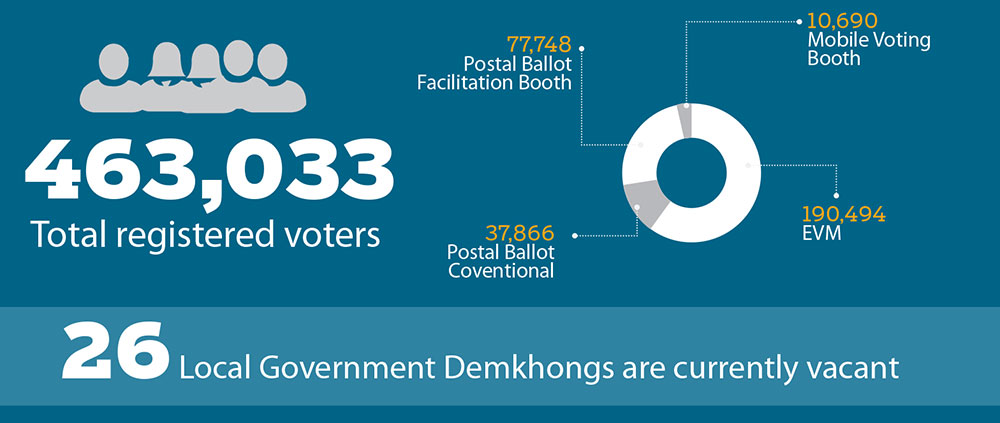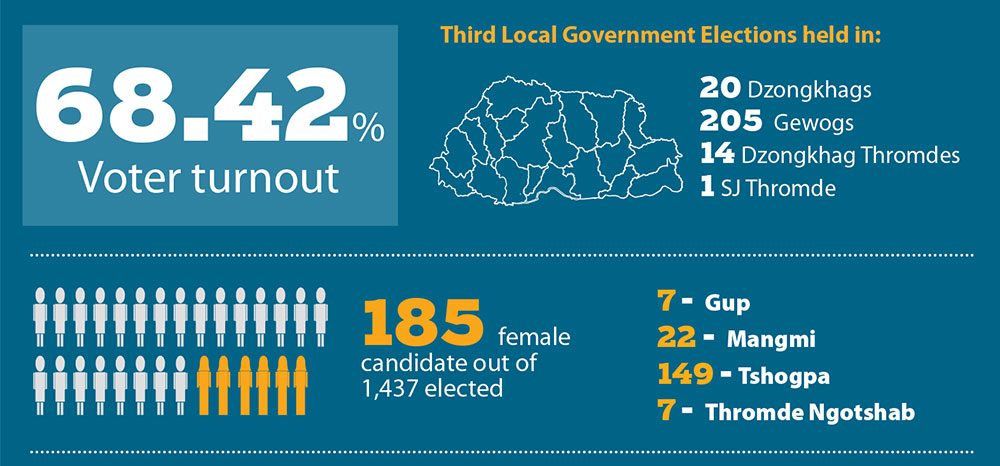MB Subba
A record high of 68.42 percent of the registered voters voted in the third local government (LG) elections, which concluded on December 22.
Out of 463,033 registered voters in the country, 316,798 turned up and cast their votes either on the electronic voting machines (EVM) or through postal ballots, according to the official results declared by the Election Commission of Bhutan (ECB) yesterday.
The voter turnout increased by 12.62 percentage points from the second LG elections in 2016, which saw a 55.8 percent voter turnout.
According to officials, the high voter turnout signified the level of competition among candidates and the importance the electorate had given to local governments.
Although the number of female candidates was relatively smaller than that of men, more women than men exercised their voting rights in the elections. Almost 52 percent of those who voted were women.
The total EVM and postal votes cast were 190,494 and 126,304 respectively. This means that almost 40 percent of the voters voted through conventional postal ballots, paper ballot facilitation booths, and mobile facilitation booths.

Polls were held in the 205 gewogs, 14 dzongkhag thromdes and the Samdrupjongkhar thromde.
A total of 3,500 candidates contested the elections for the posts of thrompon, gup, mangmi, thromde ngotshab, chiwog tshogpa and thromde tshogpa.
According to ECB, 1,437 of the candidates, including 185 women, were elected yesterday.
The results were issued yesterday evening, 27 and a half hours after the polls had closed.
The ECB’s spokesperson, Phub Dorji, on the evening of the poll day said that it should not be considered as a delay given the high numbers of postal ballots. “We ensured that the elections took place smoothly,” he said.
Polling officials attributed the delay to the huge number of postal ballots. “In the past elections, people from the private sector did not get postal ballots,” said one of the Returning Officers.
After the conclusion of the election, 26 LG constituencies remain vacant due to negative voting, tied results, and lack of candidates. “Polls in these constituencies shall be called in due course of time,” the ECB stated.
Following the reconsideration of audit clearance of nine candidates, the ECB has rescheduled elections in the eight affected gewogs on January 6.
In view of the Covid-19 pandemic, senior citizens, voters living with disabilities, and voters with physical infirmities were facilitated with the mobile voting booth.
The ECB had set up 186 paper ballot facilitation booths in the 20 dzongkhags to facilitate voters residing outside their dzongkhags to vote in person using paper ballots.
The ECB stated that timely adjudication of disputes and addressing of complaints are key factors that contribute to free and fair elections and ensure public trust in the integrity of the system and outcomes.
According to the press release, 12 cases were reported during the election period, of which one was decided by the ECB.
While three of the cases were decided by the central election dispute settlement body, eight were decided by the dzongkhag election dispute settlement bodies.
The Office of Media Arbitrator investigated three complaints related to the use of social media and took action on them.
The 10-day petition period, which started yesterday, will end at 5pm on January 5.


